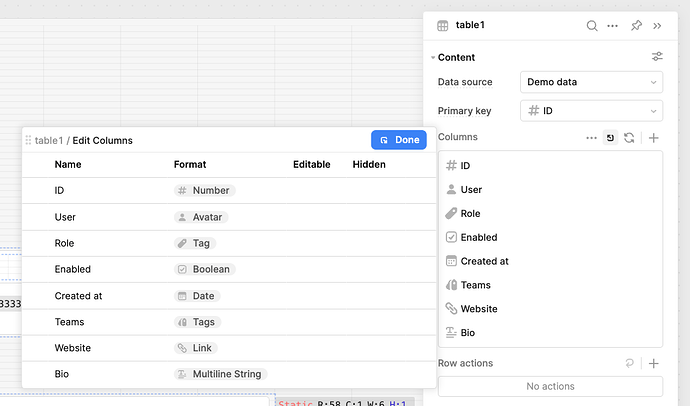First of all, the bulk editor is hugely helpful. My ideal state is to only click into columns for more complex controls, like adding events and options lists (but see below). For a simple "here's the data so you can look at it and maybe select a row or two" table, the bulk edit is much more efficient.
The bulk editor would seem the logical place to add some of the capabilities I am suggesting. For example, if each column's "Mapped Value" would show up in the editor, it would be more straightforward to cleanup/remove any Lodash (or maybe instead of/in additional to LoDash code have a set of pre-defined options like "All Caps", Capitalize First Word", "All lower-case", etc.) without having to click into lots of different columns and click back out again and all that.
The root use cases that brought this up for me
(1) I often have the same "enumerated values" relationship from a DB used across multiple tables. I prefer to have the FK as the field in the table data and map it to a (usually cached) set of values for the label. In this event, having the field automatically set as "Tag" is useful as it gets me half of the way there with the mapping. However, I still don't prefer the Lodash because depending on the label values it can still get a little messy visually.
(2) Sometimes I just want to display the mapped value and I'm not really doing anything with it like passing the FK to another query or an update. In that case, having the values show up as tags (which they typically do) and having Lodash applied is anti-useful. If I don't want it to be a colored pill, I need to change the setting to String, or change the color of the pill to 00000000. And the Lodash is only useful if the value is not stored as it should be displayed, which is less common in my use.
My ideal solution
Have the ability to set up the app with a global field setup for (some or all) of the tables used in the app (still allow changes table by table) such that (1) whenever the field tbl.foo_fk is used in a application table, the field is automatically set as a tag with correct mapped options (enum.foo_pk for value, enum.foo_value for the label and also the colors, etc.) from the table query that has the PK, and (2) for a defined set of fields, never assign them as tag or apply Lodash.
Thanks for taking a look at this.
p.s. Would also be nice to be able to edit column names directly from the bulk editor
